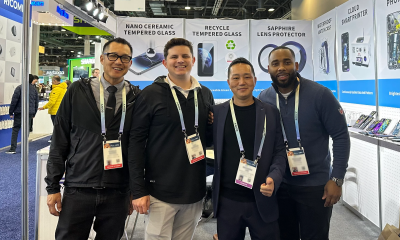Technology
Investment in augmented, virtual reality flatlines, except Magic Leap


Shaq, with Magic Leap’s headset.
Magic Leap/Recode
-
Magic Leap, an insanely hyped augmented reality
startup, is regularly pulling in hundreds of millions of
dollars in funding. -
But investment in the broader augmented reality and
virtual reality industry is flatlining. -
New data shows how over the past three years,
investment in the AR/VR space — excluding Magic Leap — has
stayed fairly steady.
Investment in two fields that promise to be the next big thing in
computing — augmented and virtual reality — has exploded over the
last year or so, frequently hitting highs of more than half a
billion dollars a quarter.
But when you remove Magic Leap, one of the buzziest startups in
the space, from the analysis, it’s a very different story.
New data from analytics firm CB Insights, as highlighted in a
research note by Goldman Sachs analysts, indicates that funding
in the space has effectively stalled at around the $100 million
mark for the last four quarters running — with the exception of
Magic Leap.
Virtual reality is all about building virtual worlds and
immersive, 365-degree headsets and hardware that let users
experience it like they’re really there. Augmented reality, a
closely-related technology, takes these virtual objects and
overlays them over the real world via special headsets or
smartphone cameras.
Advocates of the tech say it will revolutionize how humans
interact with computers, radically lowering the barriers between
what is real and what is “virtual.”

Magic Leap’s
headset.
Magic
Leap
Magic Leap, which builds augmented reality headsets, has been
shrouded in secrecy for years. It has a roster of A-list
investors including Google and Alibaba, and has repeatedly pulled
in funding rounds in the hundreds of millions of dollars ($502
million in Q4 2017, and another $461 million in Q1 2018, for
example).
It finally, officially launched its first hardware product in
August 2018.
The data clearly illustrates just how disproportionate Magic
Leap’s levels of investment are to the broader industry,
and how, once the firm is taken out of the picture, the levels of
capital flowing in to support AR and VR have hit a years-long
plateau.

The light blue bars are
Magic Leap investments, light blue is AR/VR investments excluding
Magic Leap, and the grey line represents deal
volume.
Goldman
Sachs
Of course, venture capital data alone doesn’t offer a
comprehensive view of investment in the industry. Major players
like Apple, Microsoft, and Google are all quietly developing
their own versions of the technology in-house; Microsoft’s own AR
headset, the HoloLens, beat Magic Leap to the market by over two
years.
These companies don’t break out how their spending on
AR/VR-specific R&D, so there’s no accurate way for outside
observers to assess the total investment being made into building
the tech.
Goldman Sachs analyst Heather Bellini takes a positive view of
the direction of investment in AR/VR startups, writing that
“these fundings help to underscore our viewpoint that potential
use cases for AR/VR continue to grow as the technology continues
to mature. Given the trajectory of AR/VR funding in 2Q18, we
remain confident in our view that AR/VR investment remains on the
rise.”
Indeed, the general trajectory for both funding levels and volume
of deals remains slowly positive, despite the recent
deceleration.

The HoloLens, Microsoft’s augmented reality
headset.
Microsoft
What’s most clear from the data is just how anomalous Magic Leap
is, and how the hype has translated into unprecedented amounts of
cash flowing into its coffers. And now that its debut product,
the Magic Leap One, is on the market, some
critics have suggested that the device wasn’t worth the
wait.
The Verge’s Adi Robertson said it “doesn’t seem like a
satisfying computing device,”
while Scott Stein at CNET wrote that “my initial experience
didn’t blow me away, despite Magic Leap’s promises.” And
The Wall Street Journal’s Joanna Stern called it “a bold,
exciting, petrifying vision of the future” — but after testing it
out, cautioned: “I don’t suggest anyone run out to buy one—maybe
not for years.”
These responses could ominous news for Magic Leap — and run the
risk of sparking disillusionment with the nascent technology,
making fundraising even more difficult for the rest of the
industry before it’s even really had its breakthrough moment. In
other words, with this much money flowing in, Magic Leap will
have to prove it’s more than just hype.
Got a tip? Contact this reporter via Signal or WhatsApp at +1
(650) 636-6268 using a non-work phone, email at
rprice@businessinsider.com, WeChat at robaeprice,
or
Twitter DM at @robaeprice. (PR pitches by
email only, please.)
You can
also contact
Business Insider securely via SecureDrop.
Now read:
-

 Business7 days ago
Business7 days agoConsumer Financial Protection Bureau fines BloomTech for false claims
-

 Business5 days ago
Business5 days agoLangdock raises $3M with General Catalyst to help businesses avoid vendor lock-in with LLMs
-

 Entertainment5 days ago
Entertainment5 days agoWhat Robert Durst did: Everything to know ahead of ‘The Jinx: Part 2’
-

 Entertainment5 days ago
Entertainment5 days agoThis nova is on the verge of exploding. You could see it any day now.
-

 Business4 days ago
Business4 days agoIndia’s election overshadowed by the rise of online misinformation
-

 Business4 days ago
Business4 days agoThis camera trades pictures for AI poetry
-

 Business5 days ago
Business5 days agoCesiumAstro claims former exec spilled trade secrets to upstart competitor AnySignal
-

 Business6 days ago
Business6 days agoScreen Skinz raises $1.5 million seed to create custom screen protectors






















